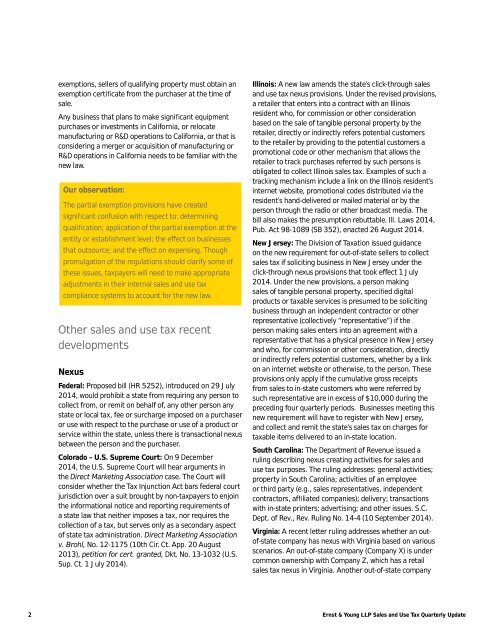EY-sales-and-use-tax-quarterly-october-2014
EY-sales-and-use-tax-quarterly-october-2014
EY-sales-and-use-tax-quarterly-october-2014
You also want an ePaper? Increase the reach of your titles
YUMPU automatically turns print PDFs into web optimized ePapers that Google loves.
exemptions, sellers of qualifying property must obtain an<br />
exemption certificate from the purchaser at the time of<br />
sale.<br />
Any business that plans to make significant equipment<br />
purchases or investments in California, or relocate<br />
manufacturing or R&D operations to California, or that is<br />
considering a merger or acquisition of manufacturing or<br />
R&D operations in California needs to be familiar with the<br />
new law.<br />
Our observation:<br />
The partial exemption provisions have created<br />
significant confusion with respect to: determining<br />
qualification; application of the partial exemption at the<br />
entity or establishment level; the effect on businesses<br />
that outsource; <strong>and</strong> the effect on expensing. Though<br />
promulgation of the regulations should clarify some of<br />
these issues, <strong>tax</strong>payers will need to make appropriate<br />
adjustments in their internal <strong>sales</strong> <strong>and</strong> <strong>use</strong> <strong>tax</strong><br />
compliance systems to account for the new law.<br />
Other <strong>sales</strong> <strong>and</strong> <strong>use</strong> <strong>tax</strong> recent<br />
developments<br />
Nexus<br />
Federal: Proposed bill (HR 5252), introduced on 29 July<br />
<strong>2014</strong>, would prohibit a state from requiring any person to<br />
collect from, or remit on behalf of, any other person any<br />
state or local <strong>tax</strong>, fee or surcharge imposed on a purchaser<br />
or <strong>use</strong> with respect to the purchase or <strong>use</strong> of a product or<br />
service within the state, unless there is transactional nexus<br />
between the person <strong>and</strong> the purchaser.<br />
Colorado – U.S. Supreme Court: On 9 December<br />
<strong>2014</strong>, the U.S. Supreme Court will hear arguments in<br />
the Direct Marketing Association case. The Court will<br />
consider whether the Tax Injunction Act bars federal court<br />
jurisdiction over a suit brought by non-<strong>tax</strong>payers to enjoin<br />
the informational notice <strong>and</strong> reporting requirements of<br />
a state law that neither imposes a <strong>tax</strong>, nor requires the<br />
collection of a <strong>tax</strong>, but serves only as a secondary aspect<br />
of state <strong>tax</strong> administration. Direct Marketing Association<br />
v. Brohl, No. 12-1175 (10th Cir. Ct. App. 20 August<br />
2013), petition for cert. granted, Dkt. No. 13-1032 (U.S.<br />
Sup. Ct. 1 July <strong>2014</strong>).<br />
Illinois: A new law amends the state’s click-through <strong>sales</strong><br />
<strong>and</strong> <strong>use</strong> <strong>tax</strong> nexus provisions. Under the revised provisions,<br />
a retailer that enters into a contract with an Illinois<br />
resident who, for commission or other consideration<br />
based on the sale of tangible personal property by the<br />
retailer, directly or indirectly refers potential customers<br />
to the retailer by providing to the potential customers a<br />
promotional code or other mechanism that allows the<br />
retailer to track purchases referred by such persons is<br />
obligated to collect Illinois <strong>sales</strong> <strong>tax</strong>. Examples of such a<br />
tracking mechanism include a link on the Illinois resident’s<br />
internet website, promotional codes distributed via the<br />
resident’s h<strong>and</strong>-delivered or mailed material or by the<br />
person through the radio or other broadcast media. The<br />
bill also makes the presumption rebuttable. Ill. Laws <strong>2014</strong>,<br />
Pub. Act 98-1089 (SB 352), enacted 26 August <strong>2014</strong>.<br />
New Jersey: The Division of Taxation issued guidance<br />
on the new requirement for out-of-state sellers to collect<br />
<strong>sales</strong> <strong>tax</strong> if soliciting business in New Jersey under the<br />
click-through nexus provisions that took effect 1 July<br />
<strong>2014</strong>. Under the new provisions, a person making<br />
<strong>sales</strong> of tangible personal property, specified digital<br />
products or <strong>tax</strong>able services is presumed to be soliciting<br />
business through an independent contractor or other<br />
representative (collectively “representative”) if the<br />
person making <strong>sales</strong> enters into an agreement with a<br />
representative that has a physical presence in New Jersey<br />
<strong>and</strong> who, for commission or other consideration, directly<br />
or indirectly refers potential customers, whether by a link<br />
on an internet website or otherwise, to the person. These<br />
provisions only apply if the cumulative gross receipts<br />
from <strong>sales</strong> to in-state customers who were referred by<br />
such representative are in excess of $10,000 during the<br />
preceding four <strong>quarterly</strong> periods. Businesses meeting this<br />
new requirement will have to register with New Jersey,<br />
<strong>and</strong> collect <strong>and</strong> remit the state’s <strong>sales</strong> <strong>tax</strong> on charges for<br />
<strong>tax</strong>able items delivered to an in-state location.<br />
South Carolina: The Department of Revenue issued a<br />
ruling describing nexus creating activities for <strong>sales</strong> <strong>and</strong><br />
<strong>use</strong> <strong>tax</strong> purposes. The ruling addresses: general activities;<br />
property in South Carolina; activities of an employee<br />
or third party (e.g., <strong>sales</strong> representatives, independent<br />
contractors, affiliated companies); delivery; transactions<br />
with in-state printers; advertising; <strong>and</strong> other issues. S.C.<br />
Dept. of Rev., Rev. Ruling No. 14-4 (10 September <strong>2014</strong>).<br />
Virginia: A recent letter ruling addresses whether an outof-state<br />
company has nexus with Virginia based on various<br />
scenarios. An out-of-state company (Company X) is under<br />
common ownership with Company Z, which has a retail<br />
<strong>sales</strong> <strong>tax</strong> nexus in Virginia. Another out-of-state company<br />
2<br />
Ernst & Young LLP Sales <strong>and</strong> Use Tax Quarterly Update


